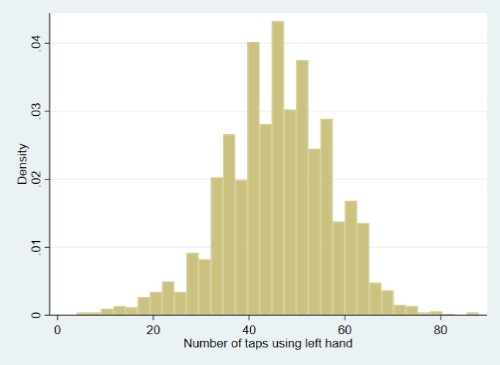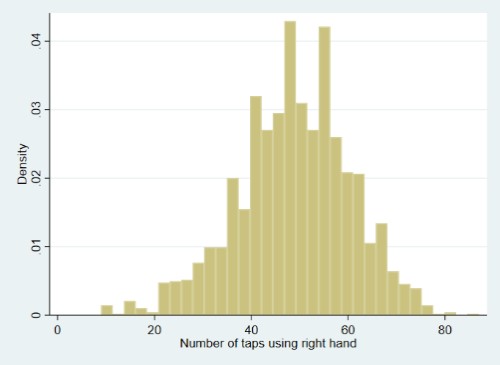The MRC National Survey of Health of Development (NSHD) assessed their cohort members (CMs) during the study’s age 68-70 sweep using the Finger Tapping Test.
Details on this measure and the data collected from the CMs are outlined in the table below.
| Domain: | Non-verbal | |
| Measures: | Psychomotor speed/fluidity | |
| Finger dexterity | ||
| CHC: | Psychomotor Speed (Gps) | |
| Administration method: | Research nurse; face to face; physical task | |
| Procedure: | With their palm down and fingers extended, participants were asked to tap a lever with their index finger as fast as possible for 10 seconds. They were asked to do this once with their right hand and once with their left. | |
| Link to questionnaire: | https://skylark.ucl.ac.uk/NSHD/lib/exe/fetch.php?media=questionnaires:2015_capi.pdf (opens in new tab) | |
| Scoring: | Number of taps per hand (0 - 88) | |
| Item-level variable(s): | TAP15x | |
| Total score/derived variable(s): | TAPLF15x, TAPRF15x | |
| Descriptives: | Left hand (raw score) | Right hand (raw score) |
| N = 2,052 | N = 2,050 | |
| Range = 4 - 88 | Range = 9 - 87 | |
| Mean = 45.98 | Mean = 48.78 | |
| SD = 11.32 | SD = 11.69 | |
(click image to enlarge) | (click image to enlarge) |
|
| Age of participants (months): | Mean = 834.14, SD = 2.93, Range = 828 - 848 | |
| Other sweep and/or cohort: | None | |
| Source: | Reitan, R. M., & Wolfson, D. (1985). The Halstead-Reitan neuropsychological test battery: Theory and clinical interpretation (Vol. 4). Reitan Neuropsychology. | |
| Technical resources: | Dumont, R., Willis, J. O., Viezel, K., & Zibulsky, J. (2013). Halstead_Reitan Neuropsychological Test Battery. Encyclopedia of Special Education: A Reference for the Education of Children, Adolescents, and Adults with Disabilities and Other Exceptional Individuals. | |
| Reference examples: | Morrison, M. W., Gregory, R. J., & Paul, J. J. (1979). Reliability of the Finger Tapping Test and a note on sex differences. Perceptual and Motor Skills, 48(1), 139-142. | |
Go to:
- Overview of all cognitive measures in NSHD
- Overview of adulthood cognitive measures across all studies
This page is part of CLOSER’s ‘A guide to the cognitive measures in five British birth cohort studies’.
